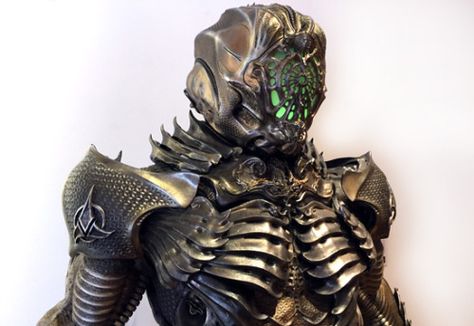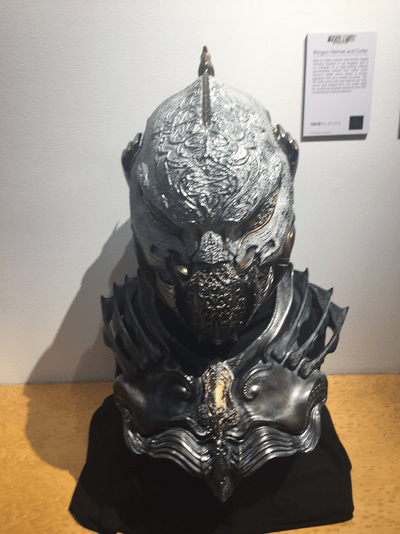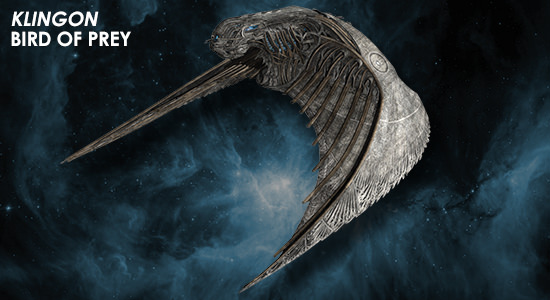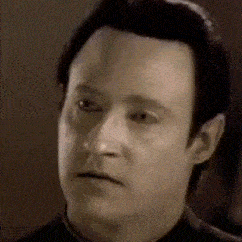I am the kind of person who enjoys “big weird” scifi like Stanisław Lem. Stories about trying to relate to and find common ground with something so alien that the prospect of even understanding is basically hopeless. Star Trek usually doesn’t do stories that, which makes sense as it often uses alien races as allegories or stand-ins for real-world human relations.
That said- I thought those early Klingons were super weird and scary because they were just so alien. It really made sense thinking about how it took a century before they could get to the events of Star Trek VI, and it made the Khittomer accords feel like so much more of an accomplishment. Like- you made a treaty with WHAT?
And just aesthetically their ships and armor looked like something out of HP Lovecraft or HR Geiger:



This is not to say I dislike how Klingons were portrayed previously, kinda like Mongols in TOS or Vikings in DS9, just that they never felt scary to me. They never felt like warriors. I was never afraid for the gallant crew of the Enterprise D (a science and exploration vessel) going into battle against Klingons. But I really enjoyed the alien-ness Disco tried to go with. Anyone else with me?
EDIT: PEOPLE I SAID WHO’S WITH ME NOT WHO ISN’T CM’ON 

For me, having them look like TNG Klingons doesn’t even solve the problem because ENT had implied that shouldn’t happen until the TOS movie era. They could have rendered explicit the implication that not every Klingon was infected by the virus, but that still doesn’t support making the Klingons look how they did in s1 DIS.
The augment virus was a really dumb idea and I’m perfectly happy for them to ignore it and never feel the need to write a plot to explain the fact that designs will change over time in a 60 year old sci fi franchise.
That’s the attitude of someone who does not really care about a continuous universe or a coherent world and just wants to watch sci-fi for the plot. If that’s the case, why not write and direct original fiction?
My entire enjoyment of Star Trek comes from the fact that it is a vast, largely consistent universe that feels real to me. I could mostly not care less about plot points or individual lead characters, I want the world that I know and love to expand. It’s like daydreaming.
Then I think you just want a totally different thing from star trek than me. imo Star Trek has always contradicted itself a lot, and I’m much more interested in the stories and characters, and I’m fine with the world being somewhat vaguely defined. There are so many things that don’t really make sense that people just gloss over, like Balance of Terror claiming that Romulans somehow have an empire in the 23rd century without having warp drive. Star Trek has been retconning stuff so much since it started that it’s weird to me for people to suddenly start caring about it when Discovery came out.
This common refrain is so condescending, as if we’re being ridiculous expecting consistency in a piece of narrative media! It doesn’t matter if the Klingons, at the time of TMP, were intended to be a total retcon, because DS9 made lines of dialog that make that impossible. I understand that there isn’t a cohesive narrative across all of Star Trek, and I don’t expect writers of an episode of 1990s television to be cognizant that maybe a prequel will come along and show anachronistic Klingons, but what I do expect is the producers of Enterprise to make better decisions than “but da klingons have ridges, how will people recognise the klingons if they look like how they did in TOS?” (IDK Berman, guess you should have thought of that before doing a prequel series).
And today, in this day and age where everyone at least knows about secondary worlds (IE, a setting distinct/irreconcilable from the real world) if not in name than be experience, I absolutely do expect a level of consistency above what we got in the 80s and 90s.
Obviously, advances in real world technology will impact how TV and movies are made, but we’re not talking about Matte Paintings vs CGI. It’s not like when the shows in the 90s made the switch from physical models to CGI, they randomly decided “hey, lets make the Romulan warbird a completely different looking ship”, they recreated the physical model. When they started to be able to show more activity or detail in establishing shots of the ship or station, they didn’t then also decide to give DS9 an extra pylon, or make it yellow and act like it always was like that.
are you talking about Worf’s “we don’t talk about it with outsiders” line in Trials and Tribble-ations? Because I also think it’s ridiculous that people took that line so seriously. It’s a little meta joke in a comedic episode that solely exists to celebrate nostalgia for TOS. I don’t get how you can take it as serious confirmation that Klingon’s appearance changed in universe in that context.
Frankly, I don’t get how someone can watch a whole scene and go “well that didn’t actually mean anything for the characters that just experienced it”. It makes more sense to assume that words have their intended meaning, and that Worf’s friends were genuinely shocked to see flat-headed Klingons than it does to pretend Worf, Bashir, and company never actually had that discussion. Like, yeah it’s all fake but main characters are supposed to be real people, the situations are supposed to be real to them…
That Enterprise arc was clearly intended to apply a (totally unnecessary) in-universe explanation for why Kirk’s adversaries were just guys in vaguely asian facial makeup, but there’s no reason we have to extrapolate that the Augment virus was a widespread and incurable until the late 23rd century. It could easily have been a relative blip on the radar; aggressively quarantined and/or cured much earlier than anticipated.
The idea that they also needed to make an explicit reference to the augment virus being cured, or explicitly point out “hey, these guys would look less different if they weren’t shaving their heads!” strikes me as absurd. These are not difficult conclusions to reach for someone motivated to find them, and there were people mentioning those possibilities pretty much immediately after the first Discovery trailer dropped.
Not to mention the augment virus does not account for why the Excalbian recreation of Kahless in “The Savage Curtain” was still a TOS era Klingon.
It really is the most flimsy plot and, as you say, completely unnecessary.
All that needed to be maintained was that the Klingons we see Kirk face in TOS were all afflicted by the virus - while it’s still reasonable to assume that, the presence of these hitherto unseen 3rd variant of Klingon complicates instead of simplifies, which is what ENT’s arc did. Now what, it’s ANOTHER coincidence that THESE klingons are even ridgier than we’ve seen before, but the other ones are still out there? To borrow your parlance, the Discovery redesign was intended to overwrite and replace what came before, because apparently Star Trek, unlike every other fantasy and science fiction thing I like, is Forbidden from being treated like a secondary world that should have its own internal consistency.
I was completely content to accept it was a coincidence that Kirk only saw augment virus-impacted Klingons in TOS, just like how ST Picard ended up establishing for Romulans (northern vs southern to explain the v shape bone ridge they had through TNG-ENT).
How many other Science Fiction properties out there sprung out of a low budget TV show from the 60s but are still producing content in the same continuity without some kind of explicit reboot?
Star Wars is the classic comparison in all sorts of ways, and for better or worse Star Wars avoids this problem entirely by 1) having a much higher budget relative to the number of sets and costumes required for it’s initial installment, 2) having picked an aesthetic that is crude, gritty, and seemingly practical which escapes looking dated many years after the fact, and 3) not being set in our future where the advances of modern tech make obviously retro elements look ridiculous.
There is Doctor Who, and that’s it.
Actually, DW is a good example, because the continuity of that show is a mess, and very intentionally so. That show thrives in its inconsistencies. There are three different explanations for why the Doctor can change faces when he dies, for example. And each one contradicts the others. There is also no beta canon, every tie in is considered canon. So the doctor has officially met Batman, Gandalf and Picard. That’s canon.
In the end IP is a playground and continuity should enhance story. Nobody gains anything from lore for the sense of lore. What does the Klingons always looking a certain way say? Not all that much. It’s a nice to have, because it allows you to recognise them quickly and make connections. But if the look is constricting for the creative team, then they should be able to change it.
Dr Who’s visual continuity on the other hand is pretty strong when bringing back old creatures. Daleks still look like they did in 1965, the Sontarians as they did in 1973, the Zygons as they did in 1975, etc. The only race that got a major change was the Cybermen which was explained by being an alternative universe version. Even they eventually cycled round to their original 1966 look by the end of Capaldis era.
I mean… not that much. Daleks have gone through three redesigns just since the show went back. Sontarans went from the world’s most unconvincing rubber masks to makeup. And how many eyes do Silurians have-- two, or three?
The point is though that DW confirms again and again that how things looked is accurate. We see a 70s Cyberman helmet in 2005, before we see the Modern Cyberman. We’ve seen the Dalek redesigns happen, and past designs all the way back to the 60s reappear.
Sontarans are a clone race, so its not difficult to imagine changes happened to their process or gene template over time. Perhaps one day we’ll see a mixed Sontaran fleet with the short stocky guys from Series 4 and the taller ones from Classic Who and Chibnal. Perhaps Silurians have different subspecies. Those are easy, one sentence explanations, that don’t rely on scoffing at old SFX and going “well its broken already anyways”.
Doctor Who has faithfully recreated sets, props, and costumes from as far back as the 60s as recently as 2017. Continuity is a different story - there’s literally no doctor who canon - as the constant time traveling impacts things. Even the smaller TARDIS exterior from the Classic series is referenced as an actual, visual difference by the revival series. The current powers that run Star Trek would just pretend it was always that big.
I’ll never accept the idea that it’s okay to update a design but not properly reboot it and set it in a completely different and seperate continuity just because what you’re making a spin-off of is old enough that it doesn’t deserve to be treated legitimately. How many more years before the crude, gritty aesthetic of Star Wars suffers the same fate as the crude and campy aesthetic of Star Trek?
Whole series of television shouldn’t be ignored by their own spinoffs just because their set designer and marketing teams decided something was lame or uncool.
People complained about exactly that during the Prequel Trilogy.
To give credit where it’s due, RotS and many of the Disney-era Star Wars products have gone a long way to fitting the glamorous, shiny prequel aesthetic into the gritty, used, “lived in” aesthetic of the OT. I’m not the biggest fan of The Last Jedi, but I actually think the implicication of the shiny galaxy just being a property of the rich inner rim planets was a great move in unifying everything.
There’s also the idea that the Empire mass produced everything to a cheaper quality which lead to less frills and faster decay. Supposedly The Acolyte show is gonna extrapolate from this further, and is set like 300 years before the prequels.
Nonsense-- other long-running universes encounter retcons and visual redesigns all the time. Quick, how old was Dick Grayson when he first became Robin? What color is Superman’s S? How old was Magneto during the Holocaust? What happened to Luke’s father? Did James Bond fight in World War 2, or participate the Cold War?
As far as I know, those examples all either explicitly exist or are treated as seperate and distinct when you look at their wikis. Comic book continuity sometimes is something the characters are aware of too, so differences are also explained. Crisis on Infinite Earths comes to mind.
Then as someone who does know a lot about this stuff I can tell you that you are making a lot of assumptions that are not the case.
Any example I can think of I have an answer for that solves any sort of continuity issue. Events change because of actual meddling in events and in-universe continuity resets. Events contradict each other between comics and TV and movies because they for all intents and purposes, are as seperate from each other’s continuity as Star Wars and Babylon 5.
James Bond, for instance, is a different person from each actor to have played him, in addition to the version from the novels by Ian Fleming. His backstory can change between them, drastically. It doesn’t make it in the same category as Discovery Klingons.
That’s not canonical, merely a popular theory.
Perhaps it implied that.
But it only ever implied that, and meanwhile we had other evidence that implied a separate conclusion, in the form of Kor, Kang, and Koloth.
Which is more likely-- that every Klingon Kirk encountered during his five-year mission was a survivor of the augment virus (edit: Including Kahless, who lived and died centuries before Archer!) and no Klingon encountered outside of that time period was; or that the Klingons ruthlessly quarantined or even executed carriers of the augment virus and wiped it out before it got too far, and TOS’s visuals aren’t literal?
Well that’s the thing that I don’t like - we got 40+ years of TOS looking like TOS across three examples in three shows, and when it was done it was fun as heck on all three, and all managed to include modern sfx for their time alongside authentic TOS visuals. That’s all I wanted from Discovery when it was announced to be between The Cage and Where No Man Has Gone Before.
It’s one thing to do as a one-off gag or a nostalgia bit. It would not have been possible to take seriously for an ongoing series in 2017, except for hardcore fans that don’t need to be sold on it.
Thats an assumption. It was okay barely 12 years earlier? It’s pretentious to act like it wouldn’t have been possible, and if that’s really the case, then why the hell is it being set in the oldest production era? It’s not a problem for modern Doctor Who to faithfully recreate sets from the 60s, and those weren’t even in color originally.
Making a series in the 2250s I would expect sets to at least feel like they fit together. They had to extrapolate what a jefferies tube looked like in ENT, since we never saw that set in TOS. The new things should look spiffy (so the Crossfield class, and aliens like Kelpiens are a-okay in my book since we never saw either of those things before and can therefore exist alongside each other), but older things should be recreated with better quality (like the ENT modernisations of Tellarites and Andorians, for example) as much as possible, and I’d argue most of the time that is the default in shared universes.
And the DIS s1 klingons look broadly like the TNG klingons, just exaggerated.
Folks forget the klingon’s made that Augment virus which then got loose in a lab breach. If they could do that to themselves on accident imagine what they’d do to themselves on purpose to try and compensate as the implications of the augment virus turn thier society upside down. There’s much I don’t like about Disco Klingons but the face redesign intrigued me as a potential reaction and over correction to the augment arc in ENT, and how past exchanges like that ultimately lead to federation vs klingon hostilities. Unfortunately Disco didn’t capitalize on this probably cause if they start explaining things they’d ultimately have to admit they can’t get away with haveing the longest heroship in canon…